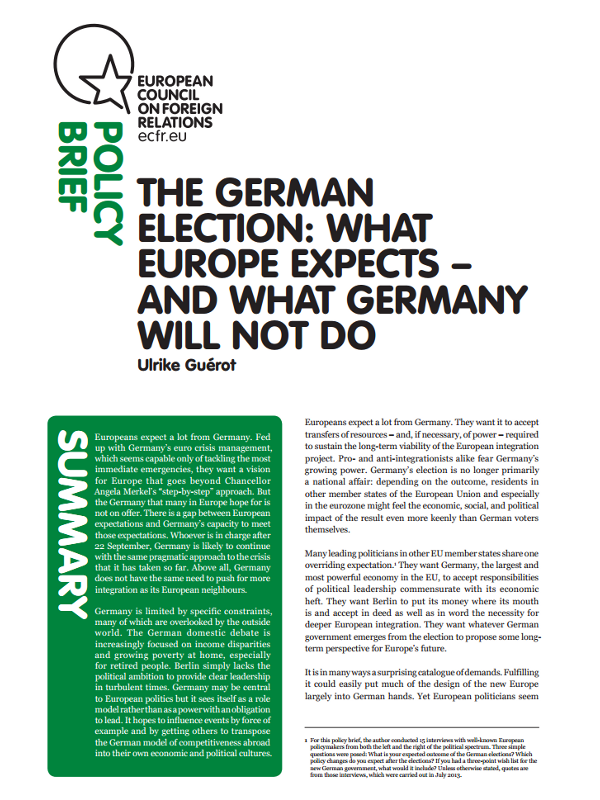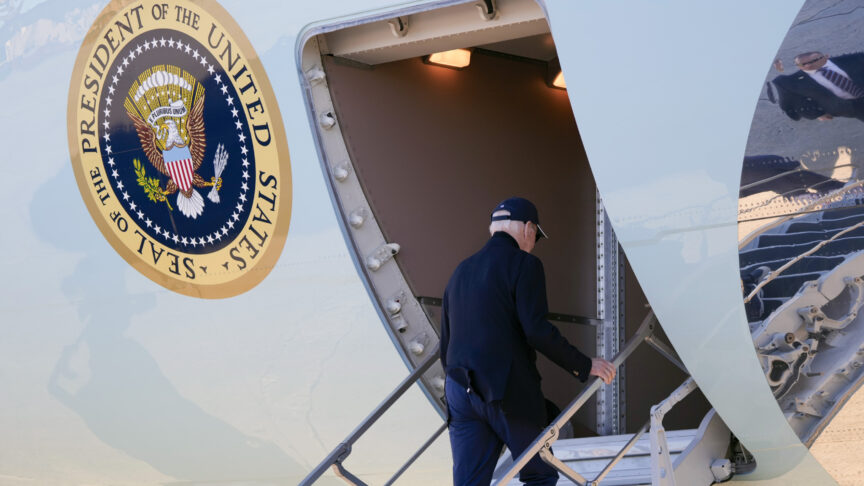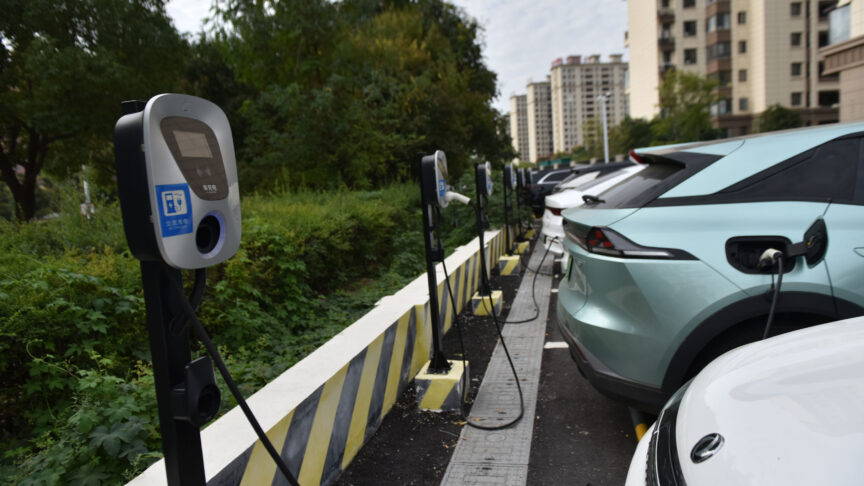Angela Merkel and Germany’s political zeitgeist
Angela Merkel defines the political zeitgeist in Germany. But contrary to appearances, Germany is facing a period of difficult choices – independently of who takes office after the elections.
 The almost certain electoral success of Angela Merkel in the German elections on Sunday will be a confirmation of the exceptional symbiosis between the chancellor, who has been in power for eight years, and the German public. Probably no other German chancellor since Willy Brandt has had such a good understanding of the existing social sentiment – and a symbol of German political zeitgeist.
The almost certain electoral success of Angela Merkel in the German elections on Sunday will be a confirmation of the exceptional symbiosis between the chancellor, who has been in power for eight years, and the German public. Probably no other German chancellor since Willy Brandt has had such a good understanding of the existing social sentiment – and a symbol of German political zeitgeist.
It is customary in Germany to refer to the period of office of particular chancellors with the high-sounding description of an “era”, regardless of the calibre of their actual achievements. Today, sociologists and pollsters agree that there is no mood for political change among Germans. The public wants the „Merkel era” to continue, but this could well be a Faustian desire to “stay, thou art so beautiful”, which is based on the largely false conviction that maintaining the status quo is the best guarantee for a bright future. In fact, the “Merkel era” that has become synonymous with peace and prosperity, particularly during the last four years, may well turn out to be no more than a transitional period between a decade of post-reunification turbulence and renunciation – and the necessity for Germany to make a significant switch in a few essential policy areas. It is a period of unfinished business rather than a turning point that opens a new stage in the history of Germany.
The Teflon Lady
Angela Merkel is notoriously post-political, a so-called “Teflon politician” without strong opinions or a clear vision. Although this is not the place for reflecting on whether this assessment is correct, it is also no coincidence that a person with such a profile reaches record popularity and enjoys widespread public trust. One can also argue that this corresponds to a European norm, and many contemporary statesmen and women could be described in a similar way – and Poland is no exception here. Although in Germany, notions of post-politics and post-ideology are also linked to the specificity of the country that had to reinvent itself in various ways after 1990. Many social and political conflicts, such as those concerning national identity, the role of Germany in foreign policy, or the relation between the eastern and western parts of the country stem from Germany’s unique history. Others, such as questions about nuclear energy, environmental protection, attitudes towards homosexuality and debates about multiculturalism have converged with the belated generation exchange in the world of politics – the departure of the “long generation” of Helmut Kohl and the arrival of the power hungry ’68 generation and the Gerhard Schröder government, formed in 1998.
Merkel came into power in 2005, when most of these conflicts had been resolved. Schröder’s social reforms (change in the rules of citizenship, withdrawal from nuclear energy, introduction of civil partnerships) amounted to a political atonement for the liberalisation of the German society over the last few decades. Reforms of the labour market and the social security system (also known as “Agenda 2010”) were a necessary, albeit painful, adaptation of the German economic model to the new realities of the global economy. The heated debates on the participation of German soldiers in Kosovo, Iraq and Afghanistan eradicated more than one taboo, opening the way to a new, though volatile, consensus on the question of international involvement of Germany. Fifteen years after the reunification, the East-West division of the country remained an important issue, but it was no longer remained in the centre of the German political debate. Seen from this perspective, Merkel took over at a time when the nation was more reconciled with itself than perhaps ever before, a nation expecting stability after a period of radical changes. Undoubtedly, the merit of chancellor Merkel (and the secret of her success) was that she perfectly responded to this expectation. Also, despite internal party resistance, she managed to modernise the conservative CDU, turning it into one of the pillars of the new social consensus (such as the change of position on the role of women, energy policy, and family policy).
In recent years Merkel has not initiated any ground-breaking reforms, perhaps with the exception of abolishing conscription and a u-turn in the area of the nuclear power: the so-called “Energiewende”. Still in a grand coalition with the Social Democrats (2005-2009), she skilfully averted a longer recession of the German economy during the crisis by introducing economic stimulus packages and by reducing working hours. Under her rule, Germany literally bloomed in the European crisis, taking advantage of the favourable economic constellation (low interests on bonds and general competitive advantages). In European politics, Merkel responded to the public need to impose on the EU adherence to German principles (austerity, reforms) – for the sake of EU and German interests. This “Merkiavellistic” (Ulrich Beck) policy paid off: thanks to the position of her government during the crisis, Merkel is breaking records of popularity in Germany – and the confidence towards the euro and the EU has risen in recent months.
The not-so-bright future
Merkel turned out to be the ideal politician, considering public expectation and the spirit of the times. Her swerving political style of avoiding conflicts and large scale plans may prove a heavy burden for the future. In reality, the Merkelian era of peace and complacency that Germans are so eager to rejoice in is fuelled by numerous illusions. Germans enjoy listening to compliments concerning their economic model, but they forget about the deficits that may cost them dearly in a none too distant future: weak education, underinvested public infrastructure and a shortage of qualified labour. (For a more detailed analysis read Sebastian Dullien’s recent ECFR paper on the German model)
Today’s social peace is based on good economic output, though its sustainability is by no means certain for the reasons stated above. There is no shortage of potential social tensions; material inequalities and blocked advancement opportunities for a large part of the population are perhaps the most visible cracks in the Rheine model of capitalism. Merkel reassured the Germans by restoring their belief that the return to the deutschmark would not be a good choice, yet she failed to prepare them for the costs of saving the common currency, which may soon seriously affect the German budget (for example the expected new bail-out for Greece, and perhaps even a debt reduction for countries of southern Europe). During the time of Merkel, the debate on Germany’s international involvement has regressed – this concerns not only the reluctance to participate in foreign armed interventions, but above all the lack of strategic reflexion on Germany’s role in the world at a time when expectations towards Germany dramatically increased, especially in Europe.
Contrary to appearances, Germany is facing a period of difficult choices – independently of who takes office after September 22. In the course of the present campaign the opposition parties – the SPD and the Green Party – have dared to break the taboo and demanded tax raises for the wealthy for the sake of public investment and reducing inequalities. The parties of the current coalition (CDU/CSU and the FDP) prefer the policy of sedation (“Germany is strong and should remain so”), whilst the opposition does not have sufficient power to convince the public that an alternative to the present policy is not only possible, but also necessary. If Angela Merkel does not run out of determination or luck, saving the Euro will go down as the trademark of her “era”. And it would be a considerable achievement. But the interests of the whole of Europe would be better served by a Germany that, after a reassuring decade of the “second economic miracle”, would gather the strength to face the challenges of a new era.
The article first appeared in Polish in kulturaliberalna.
The European Council on Foreign Relations does not take collective positions. ECFR publications only represent the views of their individual authors.


